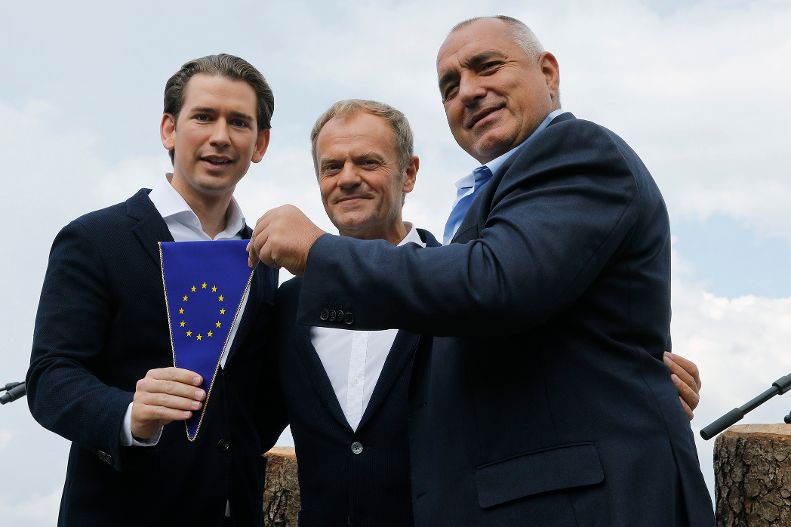
Austria takes over presidency of the Council of the European Union on 1 July 2018
‘A Europe that protects’ is the motto – Austria as a broker and bridge builder
“During its presidency, Austria intends to take on the role of bridge builder in Europe and reduce the tensions that have recently arisen. It is important to us to strengthen trust in the EU and ensure that the European Union can perform its big tasks,” said Federal Chancellor Sebastian Kurz on the occasion of Austria’s takeover of the presidency of the Council of the European Union on 1 July.
‘Servus Europe’
On 30 June, an event marking Austria’s takeover of the Council presidency was held in Schladming under the motto ‘Servus Europe’. Bulgaria symbolically handed over the presidency to Austria at a public kick-off event. Guests were able to enjoy activities such as a ‘summit picnic’, an EU hiking trail and the concluding ‘Europe LIVE’ concert in the Planai stadium.
‘A Europe that protects’
Under the motto of ‘A Europe that protects’, the Austrian government will focus on the following areas during its presidency: security and the fight against illegal migration, securing prosperity and competitiveness through digitalisation, and stability in the neighbourhood. The latter also includes the goal of supporting the continued efforts of the Western Balkan countries to move closer to the EU. In addition, Austria will advocate strengthening the principle of subsidiarity: the European Union should focus on big issues requiring a joint solution and take a step back when it comes to smaller matters where the member states or regions are in a better position to take decisions.
Coordination and representation
The main tasks of the country holding the presidency are to plan and chair the meetings of the Council and to represent the Council in relations with other European institutions. This gives Austria the opportunity to set its own priorities and to place issues on the Union’s agenda. Following its presidencies in 1998 and 2006, Austria has now, for the third time, assumed the presidency of the Council of the European Union in the second half of 2018. In these six months, the country will become an important hub in EU politics: a total of approximately 48 000 guests are expected at around 300 events. In addition, a cultural framework programme in Brussels and Austria will showcase the diversity of Austrian art and culture at European level.
The Council of the European Union
The Council of the European Union consists of the ministers of all member states and represents the interests of the national governments. It is therefore also known as the EU Council of Ministers. It meets in different configurations, depending on the policy area being discussed. Each member state sends its minister responsible for that particular topic. Thus, finance ministers meet to discuss the topic of taxes, for example, and environment ministers come together to discuss environmental issues. Only in the area of foreign policy does the distribution of roles differ: here, the chair is held by the High Representative of the Union for Foreign Affairs and Security Policy, currently Federica Mogherini.
Trio Presidency
Complementing the presidency of the Council of the European Union, which rotates every six months between the member states, the three countries that successively hold the presidency form an additional group, known as the ‘Trio Presidency’, for 18 months. Together, they work on objectives defined in the so-called ‘Trio Programme’. This is intended to facilitate the long-term planning of the presidency and ensure continuity in important topics. Austria shares the Trio Presidency with Estonia (second half of 2017) and Bulgaria (first half of 2018); its special focus is on migration, internal security, climate change, digitalisation and economic growth.